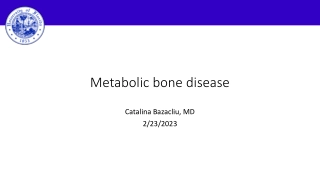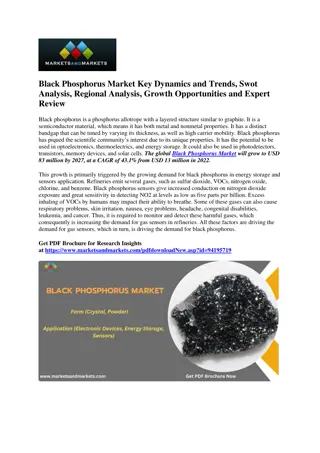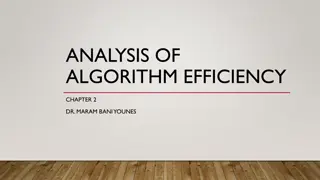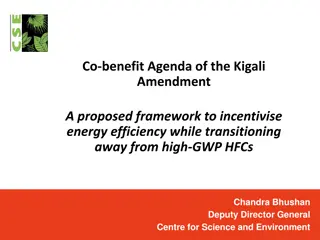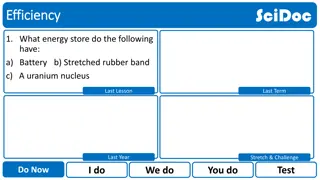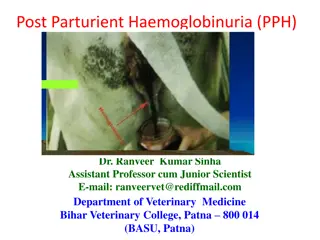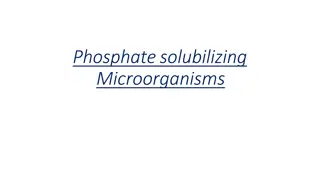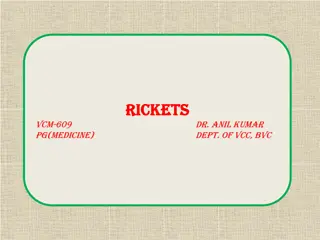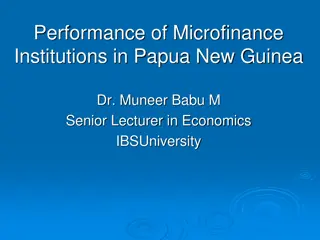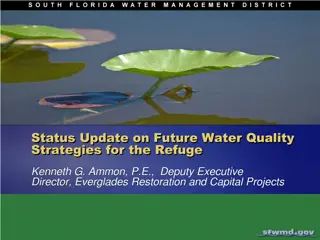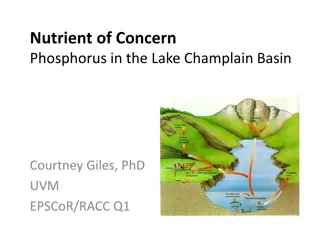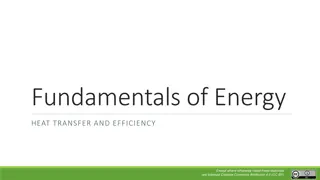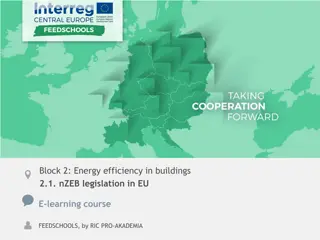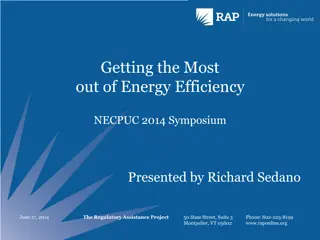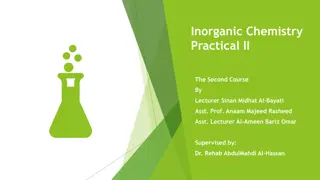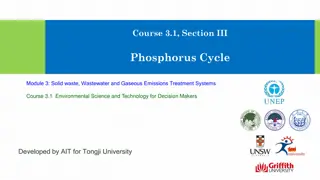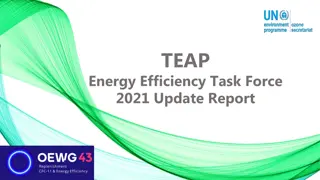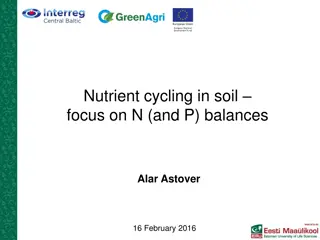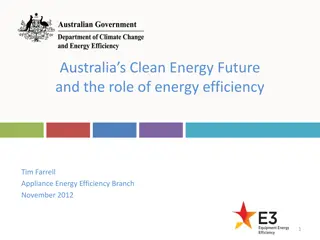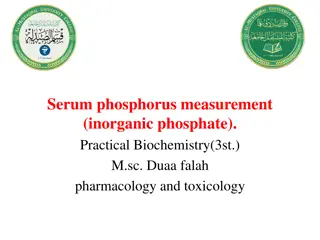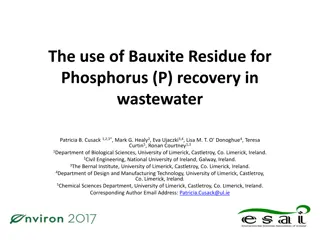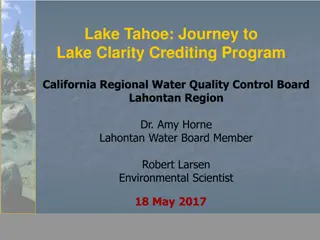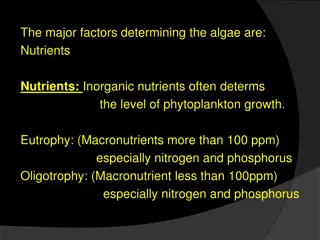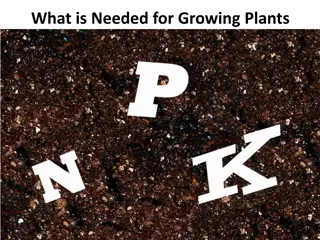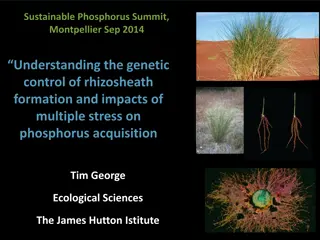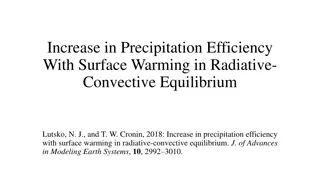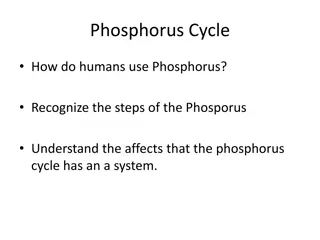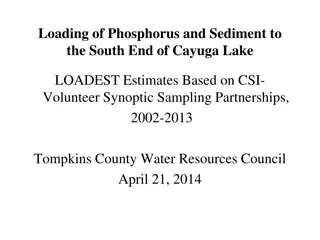Metabolic bone disease
Understand the metabolism of calcium and phosphorus, common disturbances, and nutrient requirements in preterm infants. Learn why metabolic bone disease is important and its long-term effects on bone health.
1 views • 59 slides
North America Leads the Charge in Black Phosphorus Adoption
The black phosphorus market is mainly driven by the increasing demand for gas sensors in critical industries and the implementation of various health and safety regulations globally. The key market players profiled in the report include ACS Material LLC (US), 2D Semiconductors (US), Nanochemazone (
1 views • 3 slides
Factors Affecting Global Distribution of Plants and Animals
The distribution of plants and animals worldwide is influenced by abiotic and biotic factors. Factors such as rocks, food availability, air quality, water supply, and soil type play crucial roles in determining where species thrive. From the availability of nutrients like nitrogen and phosphorus to
0 views • 8 slides
Understanding Algorithm Efficiency Analysis
In this chapter, Dr. Maram Bani Younes delves into the analysis of algorithm efficiency, focusing on aspects such as order of growth, best case scenarios, and empirical analysis of time efficiency. The dimensions of generality, simplicity, time efficiency, and space efficiency are explored, with a d
1 views • 28 slides
Transitioning Towards Energy Efficiency: Co-Benefit Agenda of the Kigali Amendment
The Kigali Amendment proposes a framework to incentivize energy efficiency while phasing out high-GWP HFCs. Reports highlight the urgency to limit global warming to 1.5°C, emphasizing the need for deep emission reductions across all sectors. Investments in low-carbon technologies and energy efficie
0 views • 17 slides
Thermal Efficiency and Controls in Spray Dryers
Understanding the thermal efficiency and control factors in spray dryers is essential for optimizing drying operations in various industries. Factors such as inlet air temperature, heat exchanger efficiency, and solids content influence the overall efficiency of the drying process. Higher efficiency
0 views • 9 slides
Understanding Energy Efficiency in Devices
Energy efficiency is a crucial concept in understanding how well devices convert energy from one form to another. This summary covers the basics of energy stores, calculation of efficiency, and ways to improve efficiency in devices. Explore the different types of energy stores such as batteries, str
0 views • 15 slides
Post-Parturient Haemoglobinuria (PPH) in Dairy Cows and Buffaloes: Causes and Clinical Manifestations
Post-Parturient Haemoglobinuria (PPH) is a metabolic disease affecting high-producing dairy cows and buffaloes. It is characterized by intravascular hemolysis, hemoglobinuria, and anemia. The condition is mainly caused by phosphorus deficiency, ingestion of certain plants, and increased phosphorus r
0 views • 19 slides
Understanding Workpapers in Energy Efficiency Programs
Dive into the world of workpapers in energy efficiency programs, covering topics such as workpaper development, deemed energy efficiency measures, the Database of Energy Efficiency Resources (DEER), and the components that make up a workpaper. Explore why workpapers are essential for providing neces
0 views • 119 slides
Harnessing Phosphate-Solubilizing Microorganisms for Sustainable Crop Growth
Phosphorus is crucial for plant growth, but its availability is often limited due to insoluble forms in soil. The use of phosphate-solubilizing microorganisms (PSMs) can help convert insoluble phosphorus into a usable form for plants. This process involves isolating, screening, and mass-producing PS
0 views • 6 slides
Understanding Rickets: Causes, Symptoms, and Pathophysiology
Rickets is a metabolic bone disorder primarily caused by deficiencies in vitamin D, calcium, or phosphorus. This leads to softening and weakening of bones, affecting bone growth and remodeling. Genetic, nutritional, and hormonal abnormalities contribute to this condition, impacting young growing ani
0 views • 16 slides
Efficiency Analysis of Microfinance Institutions in Papua: A Study by Dr. Muneer Babu
Analysis of the performance and efficiency of Microfinance Institutions in Papua New Guinea, focusing on the provision of financial services to the underbanked population. The study evaluates the resource utilization and efficiency of MFIs, comparing less efficient and highly efficient institutions.
0 views • 18 slides
Understanding Post-Parturient Haemoglobinuria in Dairy Cows
Post-Parturient Haemoglobinuria (PPH) is a metabolic disease affecting high-producing dairy cows after calving, characterized by hemolysis, hemoglobinuria, and anemia. Common in buffaloes and cows, it is caused by phosphorus deficiency in diet, affecting intracellular functions and leading to clinic
0 views • 9 slides
Understanding Energy Efficiency in Boiler Systems
Learn about the importance of energy efficiency in boiler systems, the different types of boilers, boiler components, major losses in boiler efficiency, methods for assessing efficiency, and calculations using the direct method. Exploring topics such as boiler efficiency, water treatment systems, fu
2 views • 55 slides
Future Water Quality Strategies for Refuge Kenneth G. Ammon: Update and Legal History Summary.
State and Federal parties are collaborating to enhance water quality strategies for Refuge Kenneth G. Ammon. Recent legal history highlights phosphorus exceedances and negotiations with stakeholders. Discussions include phosphorus reduction measures to meet a 17 ppb annual flow-weighted mean goal th
1 views • 15 slides
Exploring Phosphorus: History, Distribution, and Impact in the Lake Champlain Basin
Explore the history and significance of phosphorus, a nutrient of concern in the Lake Champlain Basin. From its discovery by Hennig Brand in 1669 to its various uses in fertilizers, detergents, and even warfare, phosphorus plays a critical role in the environment. Discover the global phosphorus pool
0 views • 53 slides
Understanding Energy Efficiency and Conservation Fundamentals
This unit introduces basic terms related to energy, efficiency, and conservation, covering topics such as Efficiency and Conservation Energy, First and Second Law of Thermodynamics, and various heat transfer mechanisms. It emphasizes responsible energy use, focusing on efficiency, conservation, and
0 views • 14 slides
Understanding EU Legislation and Energy Efficiency in Buildings
This module explores the EU legislation and energy efficiency in buildings with a focus on Nearly Zero Energy Building (nZEB) concepts. It covers the importance of increasing energy efficiency in buildings in the EU, showcasing statistics on energy consumption and CO2 emissions. By improving energy
1 views • 23 slides
Enhancing Energy Efficiency for Sustainable Development
This content covers a symposium on maximizing energy efficiency, presented by Richard Sedano at the NECPUC 2014 event. It introduces the Regulatory Assistance Project (RAP), a non-profit organization aiding government officials in energy and environmental issues with a focus on cost-effective energy
1 views • 27 slides
Exploring the Chemistry of Phosphorus: White, Red, and Black Phosphorus Forms
Dive into the world of phosphorus chemistry with a focus on its different forms - white, red, and black phosphorus. Learn about the unique properties, structures, and reactions of each form, from the instability of white phosphorus to the thermodynamic stability of black phosphorus. Discover how the
0 views • 16 slides
Understanding the Phosphorus Cycle in Environmental Science
Exploring the intricate processes of the phosphorus cycle, this module delves into how solid waste, wastewater, and gaseous emissions are treated within environmental science and technology frameworks. The discussion covers the distinctive aspects of the phosphorus cycle, its impact on land and wate
0 views • 13 slides
Addressing Energy Efficiency in Cooling Sector: 2021 Report Highlights
The 2021 update report from the TEAP Energy Efficiency Task Force emphasizes the critical nature of the climate emergency and the need to transition to lower GWP refrigerants and higher efficiency cooling systems. The report focuses on initiatives to enhance the efficiency of room ACs and refrigerat
0 views • 44 slides
Importance of Calcium and Phosphorus in Animal Nutrition
Calcium and phosphorus are crucial minerals for animal health, with calcium being the most abundant mineral in the body. They play essential roles in nerve impulse transmission, muscle contraction, and bone structure. Deficiencies in these minerals can lead to conditions like rickets, osteomalacia,
0 views • 11 slides
Understanding Light Emitting Diodes (LEDs)
Light Emitting Diodes (LEDs) are semiconductor devices that convert electrical energy into visible or invisible light. They are constructed using gallium, phosphorus, and arsenic materials instead of silicon or germanium. The recombination process in forward bias condition is crucial for the operati
0 views • 19 slides
Understanding Nutrient Cycling in Soil for Sustainable Agriculture
Explore the intricate processes of nutrient cycling in soil, with a focus on nitrogen (N) and phosphorus (P) balances. Discover the various inputs and outputs considered within different scales, from field to country level. Gain insights into the importance of interpreting data correctly and the imp
0 views • 22 slides
Enhancing Energy Efficiency in Saudi Arabia: SEEC's Impactful Initiatives
The Saudi Energy Efficiency Center (SEEC) plays a crucial role in improving energy efficiency in Saudi Arabia through strategic programs and initiatives. Established in 2010, SEEC focuses on sectors like transportation, industry, and buildings, with a goal to reduce energy consumption and promote aw
0 views • 29 slides
Australia's Clean Energy Future: Role of Energy Efficiency Programs
The discussion revolves around Australia's clean energy future and the pivotal role of energy efficiency in driving sustainable practices. It covers topics such as the Carbon Pricing Mechanism, Encouraging Energy Efficiency initiatives, and the Equipment Energy Efficiency Program (E3). The success s
0 views • 13 slides
Revisiting Adjustor Curves for Total Phosphorus Removal Rates
Based on a literature review, it was found that a 5th-order polynomial curve is a better fit than the originally used logarithmic trendline for anchor rates of percent Total Phosphorus removal related to runoff depth. The expert panel report reflects the old curves while trendline equations in FAQ d
0 views • 7 slides
Management of Mineral and Bone Disorder in Intensive Hemodialysis Patients
Serum phosphorus levels play a crucial role in cardiovascular risk among hemodialysis patients. Despite relatively unchanged levels over the years, a significant percentage of patients still have elevated phosphorus levels, posing cardiovascular risks. Proper adherence to phosphate binders is essent
0 views • 7 slides
Overview of Korea's Energy Efficiency Programs and Compliance Issues
Korea's energy efficiency programs include mandatory labeling and standards for various products such as refrigerators, air-conditioners, and TVs. The country faces compliance challenges related to adopting the standards of Energy Frontier, which focus on ultra-high efficiency products. Strategies t
0 views • 19 slides
Understanding Serum Phosphorus: Importance, Measurement, and Functions
Serum phosphorus, or inorganic phosphate, plays a vital role in maintaining bone health, energy production, muscle function, and overall cellular health. This mineral is found in various foods and is essential for the normal functioning of the kidneys, bones, muscles, and blood vessels. Phosphate le
0 views • 14 slides
Utilization of Bauxite Residue for Phosphorus Recovery in Wastewater
This study explores the potential of using bauxite residue, a by-product of the aluminum industry, as an adsorbent for phosphorus recovery in wastewater treatment. With the increasing demand for phosphorus and declining phosphate rock supplies, alternative methods like utilizing bauxite residue coul
0 views • 23 slides
Understanding Lake Tahoe's Environmental Challenges
The Lake Tahoe Total Maximum Daily Load (TMDL) program aims to restore Lake Tahoe's clarity by addressing pollution sources such as nitrogen, phosphorus, and fine sediment particles. The program involves a science phase, regulatory strategy phase, and implementation phase to reduce pollutant loading
0 views • 27 slides
Factors Influencing Algae Growth in Water Ecosystems
Nutrients play a crucial role in algae growth, with inorganic nutrients like nitrogen and phosphorus being key factors. Algae require macroelements such as carbon, hydrogen, oxygen, sulfur, potassium, calcium, phosphorus, and nitrogen in large quantities, as well as microelements like iron, manganes
0 views • 16 slides
The Essentials of Plant Nutrition: Nitrogen, Phosphorus, and Potassium
Plants require a balanced diet of nutrients for growth and development. Nitrogen stimulates above-ground growth, phosphorus enhances root growth and flower formation, while potassium promotes fruit development. However, excessive use of fertilizers can lead to environmental issues like algal blooms,
0 views • 6 slides
Exploring the Ethics of Efficiency in Economics Education
Delve into the intriguing discussion on whether efficiency is ethical in the realms of economics and education. This session, featuring the new Ethics, Economics, and Social Issues curriculum through EconEdLink, analyzes the concept of efficiency through diverse examples and engages participants in
0 views • 26 slides
Sustainable Phosphorus Summit: Improving Plant P-Use Efficiency for Food Security
Sustainable Phosphorus Summit in Montpellier highlights the necessity of enhancing plant P-use efficiency due to P-deficient soils and environmental concerns. Key traits controlling plant responses to P-deficiency are identified, emphasizing the critical role of phosphorus in agricultural sustainabi
0 views • 28 slides
Increase in Precipitation Efficiency with Surface Warming
The study examines how surface warming affects precipitation efficiency in radiative-convective equilibrium. Various factors influencing precipitation efficiency, such as microphysical processes and climate sensitivity, are discussed. Model experiments are conducted to test the sensitivity of precip
0 views • 33 slides
Understanding the Phosphorus Cycle and Its Impact on Ecosystems
Humans use phosphorus in various ways, from being a vital component in DNA, RNA, and cell membranes to its role in energy transfer processes. The phosphorus cycle involves steps such as weathering of rocks, phosphate mining for fertilizers, excretion/decomposition, and geologic forces. However, exce
0 views • 8 slides
Estimation Methodology for Phosphorus and Sediment Loading in Cayuga Lake Watershed
Explore the process of estimating phosphorus and sediment loading at the south end of Cayuga Lake using LOADEST methodology. Learn how to combine synoptic monitoring data with USGS flow measurements and run calculations to obtain yearly load numbers. Get step-by-step instructions and access helpful
0 views • 13 slides
